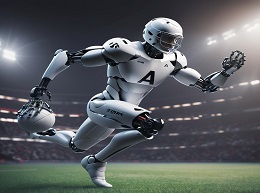Exploring AI in Sports Analytics and Performance Enhancement

Artificial Intelligence (AI) is revolutionizing the world of sports, transforming how athletes train, compete, and perform. From advanced analytics to personalized training programs, AI technologies are reshaping the landscape of sports performance enhancement. In this article, we explore the innovative applications of AI in sports analytics and performance enhancement, showcasing its potential to revolutionize the way athletes and teams approach training, strategy, and performance optimization.
Advanced Sports Analytics
Performance Analysis
AI algorithms analyze vast amounts of sports data, including player statistics, game footage, and biometric data, to provide insights into player performance and strategy. By identifying patterns, trends, and correlations in data, AI enables coaches and analysts to make data-driven decisions and optimize team performance.
Example: NBA's SportVU Tracking System
The NBA's SportVU tracking system uses AI-powered cameras installed in basketball arenas to capture player movements and interactions in real-time. AI algorithms analyze this data to generate player performance metrics, such as shot accuracy, defensive efficiency, and player positioning, enabling coaches to optimize game strategies and player rotations.
Injury Prevention and Rehabilitation
Biometric Analysis
AI technologies analyze biometric data, such as heart rate variability, movement patterns, and muscle activation, to assess injury risk and monitor athletes' physical condition. By detecting early warning signs of fatigue, overtraining, or injury, AI enables coaches and trainers to implement preventive measures and personalized rehabilitation programs.
Example: Catapult Sports' Player Tracking Systems
Catapult Sports' wearable player tracking systems use AI algorithms to analyze athletes' biomechanical data and movement patterns during training and competition. By monitoring load management, movement efficiency, and injury risk factors, these systems help coaches and trainers optimize training programs and reduce the risk of injuries.
Personalized Training Programs
AI-Powered Training Platforms
AI-driven training platforms leverage machine learning algorithms to analyze athletes' performance data and tailor training programs to their individual needs and goals. By personalizing training regimens based on athletes' strengths, weaknesses, and progress, AI maximizes training efficiency and improves performance outcomes.
Example: Strivr's Virtual Reality Training
Strivr's virtual reality (VR) training platform uses AI algorithms to simulate game scenarios and training drills in immersive VR environments. By replicating real-world situations and providing instant feedback, Strivr enables athletes to enhance their decision-making, spatial awareness, and situational intelligence, leading to improved on-field performance.
Game Strategy Optimization
Predictive Analytics
AI-powered predictive analytics models analyze historical data and game trends to forecast game outcomes, identify strategic opportunities, and optimize game plans. By simulating different scenarios and assessing their probabilities, AI helps coaches and teams make informed decisions and gain a competitive edge.
Example: IBM's Watson for Sports
IBM's Watson for Sports uses AI algorithms to analyze vast amounts of sports data, including player statistics, historical game footage, and weather conditions, to provide insights and predictions for coaches and teams. By leveraging AI-driven insights, coaches can develop strategic game plans and make in-game adjustments to maximize their team's performance.
Fan Engagement and Experience
AI-Powered Fan Engagement
AI technologies enhance fan engagement and experience by personalizing content, delivering real-time insights, and creating immersive experiences. By analyzing fan preferences, social media interactions, and viewing habits, AI enables sports organizations to tailor content and interactions to individual fans, fostering deeper connections and loyalty.
Example: Amazon's X-Ray for NFL
Amazon's X-Ray feature for NFL games uses AI algorithms to provide real-time player and team statistics, highlights, and insights to viewers during live broadcasts. By enhancing the viewing experience with interactive features and personalized content, AI-driven innovations like X-Ray engage fans and deepen their understanding and appreciation of the game.
Conclusion: Shaping the Future of Sports with AI
Artificial Intelligence is transforming the sports industry, revolutionizing how athletes train, compete, and perform. By leveraging AI-driven analytics, personalized training programs, and immersive experiences, sports organizations and athletes can unlock new levels of performance, strategy, and fan engagement. As AI technologies continue to evolve, the future of sports promises to be more data-driven, personalized, and engaging than ever before.